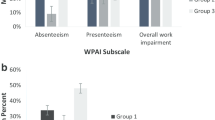Abstract
Introduction
While fatigue has been associated with work limitations the combined influence of specific diagnosis and treatment exposures based on medical records on work limitations in breast cancer survivors is currently unknown. Since symptom burden and perceived health can interfere with work, the present study investigated the relationship among these variables and work outcomes.
Methods
Medical chart abstraction, demographic measures, SF 36, the Work Limitations Questionnaire (WLQ) and measures of symptom burden, including hot flushes were obtained in 83 breast cancer survivors a mean of three years post treatment. OLS and poisson regression were used to determine the relationship of these factors to work productivity and work absences.
Results
Breast cancer survivors reported a mean reduction in productivity of 3.1% below the healthy worker norm. This amounts to a loss of 2.48 hours of work over two weeks of full time employment. Stages 1 and 2 were related to work limitations. After controlling for stage, fatigue and hot flashes were each associated with work performance losses of 1.6% (p = 0.05) and 2.2% (p < 0.001), respectively. Protective factors included marriage and greater personal earned income.
Conclusions
Fatigue and hot flashes are important factors related to work productivity in breast cancer survivors even at three years post treatment.
Implications for survivors
Therapy for hot flashes should be given serious consideration in breast cancer survivors who are experiencing work limitations.
Similar content being viewed by others
References
American Cancer Society. Breast cancer facts and figures, 2007–2008. Atlanta: American Cancer Society, Inc.
Hansen JA, Feuerstein M, Calvio LC, Olsen CH. Breast cancer survivors at work. J Occup Environ Med 2008;50(7):777–84.
Bradley CJ, Oberst K, Schenk M. Absenteeism from work: the experience of employed breast and prostate cancer patients in the months following diagnosis. Psycho-Oncol 2006;15(8):739–47. doi:10.1002/pon.1016.
Bradley CJ, Neumark D, Bednarek HL, Schenk M. Short-term effects of breast cancer on labor market attachment: results from a longitudinal study. J Health Econ 2005;24:137–60. doi:10.1016/j.jhealeco.2004.07.003.
Bradley CJ, Bednarek HL, Neumark D. Breast cancer survival, work and earnings. J Health Econ 2002;21:757–79. doi:10.1016/S0167-6296(02)00059-0.
Bouknight RR, Bradely CJ, Luo Z. Correlates of return to work for breast cancer survivors. J Clin Oncol 2006;24:345–53. doi:10.1200/JCO.2004.00.4929.
Drolet M, Maunsell E, Brisson J, Brisson C, Masse B, Deschenes L. Not working 3 years after breast cancer: predictors in a population-based study. J Clin Oncol 2005;23:8305–12. doi:10.1200/JCO.2005.09.500.
Satariano WA, DeLorenze GN. The likelihood of returning to work after breast cancer. Public Health Rep 1996;111:236–41.
Ahles TA, Saykin AJ, Furstenberg CT, Cole B, Mott LA, Skalla K, et al. Neuropsychologic impact of standard-dose systemic chemotherapy in long-term survivors of breast cancer and lymphoma. J Clin Oncol 2002;20:485–93. doi:10.1200/JCO.20.2.485.
Brezden CB, Phillips KA, Abdolell M, Bunston T, Tannock IF. Cognitive function in breast cancer patients receiving adjuvant chemotherapy. J Clin Oncol 2000;18:2695–701.
Mar Fan HG, Houede-Tchen N, Yi QL, Chemerynsky I, Fownie FP, Sabate K, et al. Fatigue, menopausal symptoms, and cognitive function in women after adjuvant chemotherapy for breast cancer: 1 and 2-year follow-up of a prospective controlled study. J Clin Oncol 2005; 23:8025–32.
Schagen SB, van Dam FS, Muller MJ, Boogerd W, Lindeboom J, Bruning PF. Cognitive deficits after postoperative adjuvant chemotherapy for breast carcinoma. Cancer 1999;85:640–50. doi:10.1002/(SICI)1097-0142(19990201)85:3<640:AID-CNCR14>3.0.CO;2-G.
Tchen N, Juffs HG, Downie FP, Yi QL, Hu H, Chemerynsky I, et al. Cognitive function, fatigue, and menopausal symptoms in women receiving adjuvant chemotherapy for breast cancer. J Clin Oncol 2003;21:4175–83. doi:10.1200/JCO.2003.01.119.
Maunsell E, Drolet M, Brisson J, Brisson C, Masse B, Deschenes L. Work situation after breast cancer: results from a population-based study. J Natl Cancer Inst 2004;96:813–22.
Hensley ML, Dowell J, Herndon JE, Winer E, Stark N, Weeks JC, et al. Economic outcomes of breast cancer survivorship: CALGB study 79804. Breast Cancer Res Treat 2005;91:153–61. doi:10.1007/s10549-004-6497-9.
Bonadonna G, Hortobagyi GN, Gianni AM. Textbook of breast cancer: a clinical guide to therapy. London: Martin Dunitz; 2001.
Lerner D, Amick BC, Rogers WH, Malspeis S, Bungay K, Cynn D. The work limitations questionnaire. Med Care 2001;39:72–85. doi:10.1097/00005650-200101000-00009.
Lerner D, Amick BC 3rd, Lee JC, Rooney T, Rogers WH, Chang H, et al. Relationship of employee-reported work limitations to lost work productivity. Med Care 2003;41:649–59. doi:10.1097/00005650-200305000-00012.
Feuerstein M, Hansen JA, Calvio LC, Johnson L, Ronquillo JG. Work productivity in brain tumor survivors. JOEM 2007;49(7):803–11.
Lerner D, Adler DA, Chang H, Berndt ER, Irish JT, Lapitsky L, et al. The clinical and occupational correlates of lost work productivity loss among employed patients with depression. J Occup Environ Med 2004a;46:S46–S55. doi:10.1097/01.jom.0000126684.82825.0a.
Lerner D, Adler DA, Chang H, Lapitsky L, Hood MY, Perissinotto C, et al. Unemployment, job retention, and productivity loss among employees with depression. Psychiatr Serv (Wash, D.C.) 2004b;55:1371–8. doi:10.1176/appi.ps.55.12.1371.
Adler DA, McLaughlin TJ, Rogers WH, Chang H, Lapitsky L, Lerner D. Job performance deficits due to depression. Am J Psychiatr 2006;163:1569–76. doi:10.1176/appi.ajp.163.9.1569.
Early Breast Cancer Trialists’ Collaborative Group (EBCTCG). Effects of chemotherapy and hormonal therapy for early breast cancer on recurrence and 15-year survival: an overview of the randomized trials. Lancet 2005;365:1687–717. doi:10.1016/S0140-6736(05)66544-0.
Mano MS, Awada A, Kerr J, Canney P. Adjuvant anthracycline-based chemotherapy for early breast cancer: do the dose and schedule matter? Cancer Treat Rev 2005;31:69–78. doi:10.1016/j.ctrv.2004.11.001.
Wefel JS, Lenzi R, Theriault RL, Davis RN, Meyers CA. The cognitive sequelae of standard-dose adjuvant chemotherapy in women with breast carcinoma: results of a prospective, randomized, longitudinal trial. Cancer 2004;100:2292–9. doi:10.1002/cncr.20272.
Ferrie JE, Kivimaki M, Head J, Shipley MJ, Vahtera J, Marmot MG. A comparison of self-reported sickness absence with absences recorded in employers’ registers: evidence from the Whitehall II study. Occup Environ Med 2005;62:74–9. doi:10.1136/oem.2004.013896.
Bower JE, Ganz PE, Desmond KA, Bernaards C, Rowland JH, Meyerowitz BE, et al. Fatigue in long-term breast carcinoma survivors: a longitudinal investigation. Cancer 2006;106:751–8. doi:10.1002/cncr.21671.
Ware JE, Snow KK, Kosinski M, Gandek B. SF-36 health survey: manual and interpretation guide. Boston: The Health Institute; 1993.
Shadbolt B, Barresi J, Craft P. Self-rated health as a predictor of survival among patients with advanced cancer. J Clin Oncol 2002;20(25):2514–18. doi:10.1200/JCO.2002.08.060.
Kaplan MS, Bertholet JM, Feeny D, McFarland BH, Khan S, Orpana H. The predictive validity of health-related quality of life measures: mortality in a longitudinal, population-based study. Qual Life Res 2007;16(9):1539–46. doi:10.1007/s11136-007-9256-7.
Brouwer WBF, van Exel NJA, Koopmanschap MA, Rutten FFH. Productivity costs before and after absence from work: as important as common? Health Policy (Amsterdam) 2002;61 (2):173–87. doi:10.1016/S0168-8510(01)00233-0.
US Census Bureau.American Community Survey. 2006 Table for the Rochester, New York Metropolitan Area. Last accessed online on August 28, 2008 at: http://factfinder.census.gov.
Pandya K, Morrow G, Roscoe J, Zhao H, Hickok J, Pajon E, et al. Gabapentin for hot flashes in 420 women with breast cancer: a randomized double-blind placebo controlled trial. Lancet 2005;366(9488):818–24. doi:10.1016/S0140-6736(05)67215-7.
US Food and Drug Administration Alert. January 31, 2008. Suicidality and Antiepileptic Drugs. Last accessed on-line on June 27, 2008 at: http://www.fda.gov/cder/drig/infopage/antiepileptics/default.htm.
Author information
Authors and Affiliations
Corresponding author
Additional information
Sources of Support: Department of Defense Breast Cancer Research Program Concept Development Award: “Chemo-Brain,” “Lost work productivity and Career Success: A Pilot Study” (DAMD 17-01-0785).
Rights and permissions
About this article
Cite this article
Lavigne, J.E., Griggs, J.J., Tu, X.M. et al. Hot flashes, fatigue, treatment exposures and work productivity in breast cancer survivors. J Cancer Surviv 2, 296–302 (2008). https://doi.org/10.1007/s11764-008-0072-z
Received:
Accepted:
Published:
Issue Date:
DOI: https://doi.org/10.1007/s11764-008-0072-z




